Bir Lehlou, 22 October 2025
To:
Mr. António Guterres
Secretary-General of the United Nations
Subject: The Situation in Western Sahara – Position of the Frente POLISARIO Regarding the Secretary-General’s Report (S/2025/612)
Mr. Secretary-General,
The Frente Popular para la Liberación de Saguía el-Hamra y de Río de Oro (Frente POLISARIO) has taken note of your report (S/2025/612) on the situation concerning Western Sahara, dated 30 September 2025 and circulated as an official UN document on 21 October 2025. The Frente POLISARIO wishes to express its position on a number of elements contained in the report.
Regarding the “situation in Western Sahara,” the report notes that the current situation “continues to be characterized by tensions and low-intensity hostilities between Morocco and the Frente Popular para la Liberación de Saguía el-Hamra y de Río de Oro (Frente POLISARIO)” (S/2025/612, para. 2).
The Frente POLISARIO wishes to recall and reaffirm that the root cause of this situation—now ongoing for five years—is Morocco’s physical and continuous breach of the 1991 ceasefire and related military agreements when its armed forces invaded what was then known as the “buffer strip” at Guerguerat, in the Sahrawi Liberated Territories, and illegally occupied additional Sahrawi territory on 13 November 2020.
It is an undisputed fact that the Moroccan occupation forces, as reported by the Secretary-General (S/2021/843, para. 35), built “a new sand wall of about 20 kilometres in Guerguerat” and “reinforced their presence over an area of about 40 square kilometres of the buffer strip.” Morocco also informed the Secretary-General, defiantly, that its actions in Guerguerat were “irreversible” (S/2021/843, para. 23).
There is therefore no doubt that Morocco materially violated and effectively shattered the 1991 ceasefire and related military agreements, leading to the “collapse of the ceasefire,” as acknowledged by the Security Council in its Resolution 2602 (2021, preambular paragraph 14). Yet, for the fifth consecutive year, the UN Secretariat remains unwilling to call things by their name and to hold Morocco, the occupying power, fully responsible for the consequences of its actions.
The Frente POLISARIO urges members of the Security Council to bear these facts in mind when they meet in the coming days to deliberate on the renewal of the mandate of the United Nations Mission for the Referendum in Western Sahara (MINURSO).
The report also refers to the two rulings of the Court of Justice of the European Union (CJEU) of 4 October 2024, which found that the EU-Morocco trade agreements on fisheries and agriculture were concluded in violation of, and in disregard for, the Sahrawi people’s consent and their right to self-determination and permanent sovereignty over their natural resources.
We therefore call upon you once again, Mr. Secretary-General, to use all means available to you to inform the international public and relevant UN bodies of all economic and other unlawful activities carried out by the Moroccan occupying power in the occupied territories of Western Sahara, which aim to impose a colonial fait accompli by force and undermine the Sahrawi people’s exercise of their inalienable right to freedom, self-determination, and independence.
Regarding the situation on the ground, the report refers to MINURSO’s observations of “drone strikes” carried out by Moroccan occupation forces, as well as “shooting incidents” and “airstrikes and others” that caused “civilian casualties” and “material damage” (S/2025/612, paras. 13, 14, and 19).
As we have emphasized in our previous communications, including our latest letter (S/2025/533), since its breach of the ceasefire on 13 November 2020, the Moroccan occupation has continued using all types of weapons—including drones—to kill not only dozens of Sahrawi civilians but also civilians from neighboring countries crossing the Liberated Territories.
The Frente POLISARIO reiterates that the deliberate targeting of civilians and civilian objects constitutes a war crime under the Rome Statute of the International Criminal Court. It also represents a flagrant violation of international humanitarian law, including the principles of distinction and the prohibition of indiscriminate attacks and acts of violence intended to spread terror among civilians. The Moroccan occupying power must be held accountable for its ongoing war crimes in Western Sahara.
The report mentions that “between January and March 2025, MINURSO observed that Morocco completed the construction of an unannounced road of about 93 km linking Smara to Mauritania through the sand wall.” The Moroccan army stated that the road was intended for “civilian use” (S/2025/612, para. 23).
The Frente POLISARIO strongly condemns this provocative and escalatory act, viewing it as another manifestation of Morocco’s ongoing policy of annexation and aggression since its military occupation of Western Sahara in October 1975. The so-called “road” is reminiscent of Morocco’s unilateral attempt in August 2016 to alter the status quo by opening a breach in its military wall and “paving a desert road” through the then “buffer strip” at Guerguerat (S/2017/307, para. 2).
The UN’s failure to act decisively at that time only emboldened Morocco to continue its destabilizing actions with complete impunity. The consequences of that tolerance are now well known.
The Frente POLISARIO therefore warns of the grave consequences that this new act of escalation could cause—not only to an already volatile field situation but also to regional peace and stability. Describing the road as “civilian” does not alter its illegal and colonial nature. The UN must act to end Morocco’s destabilizing behavior and its “war of attrition” against the UN peace process in Western Sahara.
The report notes that MINURSO’s lack of access west of the sand wall severely limits its ability to obtain reliable information (S/2025/612, para. 59). The Security Council must therefore ensure that the mission is granted full, unrestricted access throughout its area of responsibility.
It must also ensure that Morocco lifts long-standing restrictions on the Mission, including the imposition of Moroccan license plates on UN vehicles west of the wall and the stamping of UN passports in Western Sahara (S/2025/612, para. 61).
Regarding human rights, the report recalls that the UN High Commissioner for Human Rights has not been granted access to the Territory since 2015, despite repeated requests and the Council’s call in Resolution 2756 (2024) to enhance cooperation (S/2025/612, para. 69). Once again, Morocco is not held accountable for obstructing UN mechanisms.
The report also highlights systematic human rights violations against Sahrawi civilians, including repression of peaceful demonstrations, intimidation, surveillance, and harassment, particularly against Sahrawi women human rights defenders (S/2025/612, para. 70).
It further mentions the deplorable conditions of Sahrawi prisoners, especially those of the Gdeim Izik group, still detained in Moroccan prisons outside Western Sahara, deprived of family visits and suffering physical and psychological harm (S/2025/612, para. 72). We call for their immediate and unconditional release.
Morocco, as recognized in UN General Assembly Resolutions 34/37 (1979) and 35/19 (1980), is an occupying power in Western Sahara. Therefore, Moroccan information or reports about the territory lack all credibility and violate the international status of Western Sahara as a Non-Self-Governing Territory under decolonization.
The report notes that November 2025 marks the 50th anniversary of the Moroccan invasion, which began with the so-called “Green March” condemned by Security Council Resolution 380 (1975). The Frente POLISARIO recalls that Spain itself described Morocco’s actions as a “declared invasion” in its letter to the Council (S/11851, 18 October 1975).
We note your call on “all parties to reengage without delay to achieve a just, lasting, and mutually acceptable political solution ensuring the self-determination of the people of Western Sahara” (S/2025/612, para. 81).
The Frente POLISARIO reiterates that the two parties to the conflict are the Frente POLISARIO and the Kingdom of Morocco. We remain ready to cooperate with you and your Personal Envoy to achieve a just and lasting peace that ends colonialism in Western Sahara.
We also stress that the General Assembly’s resolutions on Western Sahara—recognized as a decolonization issue since 1963—continue to define the legal and political framework for the final solution.
We strongly endorse your observation that “independent, impartial, comprehensive, and sustained monitoring of the human rights situation is essential to ensure the protection of all the people of Western Sahara” (S/2025/612, para. 87).
The Frente POLISARIO once again calls upon the UN to assume its moral and legal responsibility toward the Sahrawi people, particularly civilians in the territories under Moroccan occupation.
Fifty years after Morocco’s 1975 invasion, the Sahrawi people continue to face policies of expansion, annexation by force, and systematic repression. It is time for the United Nations to enable our people to exercise their inalienable right to self-determination and independence freely and democratically.
The Frente POLISARIO reaffirms its sincere commitment to a just and lasting peace and remains ready to engage constructively with the UN and the African Union to reach a peaceful solution based on respect for the will and inalienable rights of the Sahrawi people.
In this regard, the Frente POLISARIO renews its readiness to enter into direct and serious negotiations with Morocco, in good faith and without preconditions, under UN auspices, based on the expanded proposal submitted to the Secretary-General on 20 October 2025.
We would be grateful if you would bring this letter to the attention of the members of the Security Council.
Please accept, Mr. Secretary-General, the assurances of my highest consideration and respect.
[Signed]
President of the Sahrawi Arab Democratic Republic
Secretary-General of the Frente POLISARIO

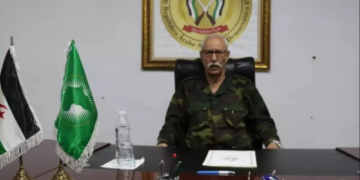
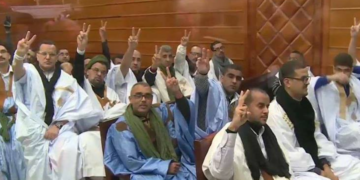
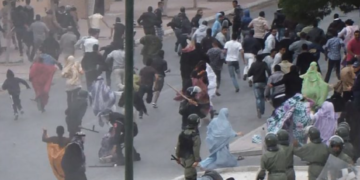
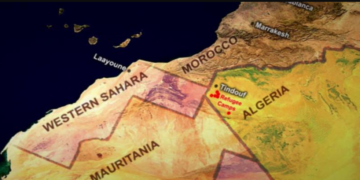
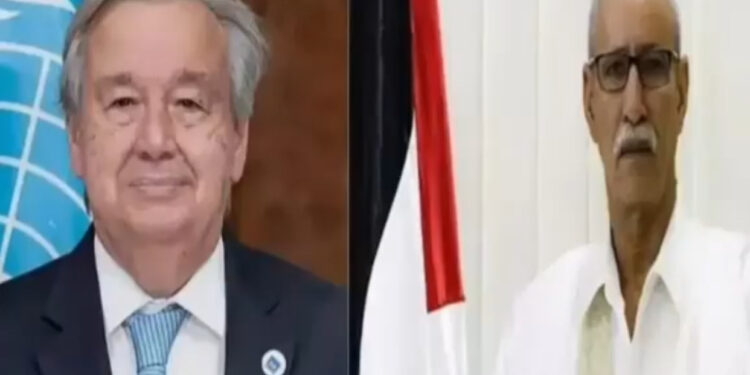
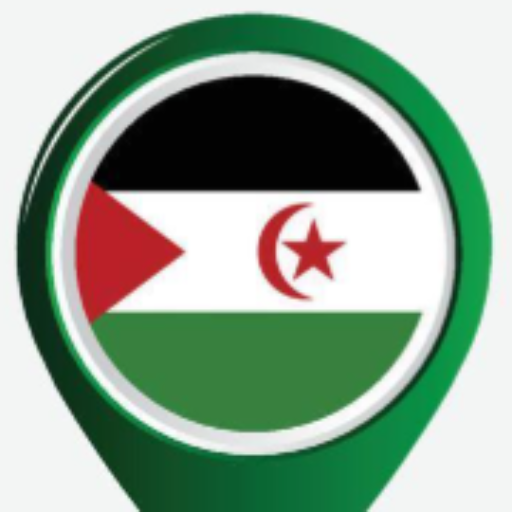
Sahara freedom